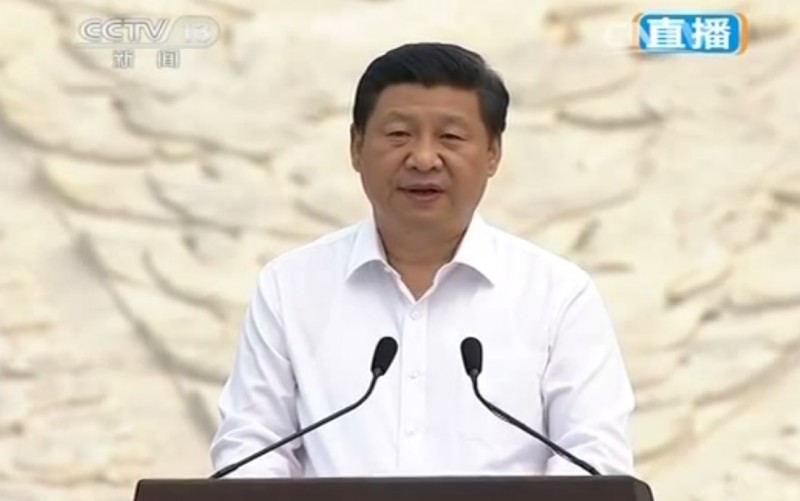 [1]
[1]Chinese President Xi Jinping delivers a speech in Beijing on Monday to mark the 77th anniversary of the start of the Second Sino-Japanese War. Screenshot from CCTV.
Chinese President Xi Jinping lambasted Japan's wartime aggression and reiterated China's commitment to peaceful development, in an emotional 13-min speech [1] aired on state television to mark the 77th anniversary of the Marco Polo Bridge incident — the battle that saw the start of the Japanese military invasion.
It's the first time the top leader of China has ever attended such a high-profile orchestrated event, as relations between Beijing and Tokyo have chilled over issues ranging from island disputes to the growing nationalism in both countries.
Addressing military representatives, a group of young students, party officials and select residents of Beijing, Xi said: “There is still a small minority of people who turn a blind eye to historical facts and ignore tens of thousands of lives lost in the war, who have gone against historic trend and have denied repeatedly or even beautified the history of invasion”.
Xi's designation of “a small minority” is an apparent reference to the right-wing politicians in Japan who have rejected what China says were Japanese wartime atrocities that include the infamous Nanjing Massacre and forced sexual slavery during the Second Sino-Japanese War from 1937–1945.
“The purpose of this ceremony is to remember history, reflect on our revolutionary ancestors, cherish peace and be vigilant of future [risks] and for China to resolutely walk down a path of peaceful development and safeguard world peace,” Xi said at the beginning of his speech. He added that the denial of history has damaged mutual trust and created regional tension.
Xi's speech was followed by a brief event in which a group of schoolchildren and youth representatives chanted in unison: “To firmly remember history, cherish peace, not forget national shame and realise the China dream”.
In response to Monday's commemoration, Yoshihide Suga, Japan's chief government spokesperson, said China's attempt to dredge up wartime history and turn it into an international issue was unnecessary and does not help in building peace and cooperation in the region, according to the Associated Press [2].
Mainstream western media have described [3] China as more diplomatically aggressive since Xi became China's president in 2012. Xi presided over the creation of an Air Defence Zone [4]that covers a large swath of the East China Sea, which has drawn the ire of the U.S. and Japan. Beijing has rejected the idea that it's an act of provocation and unilateralism. In another widely watched move, China in May transported an oil rig to disputed waters in the South China Sea, prompting mass anti-China protests in Vietnam, which Beijing has branded as illegal.
China is seeking more regional sway with its increasingly economic clout. A recent Economist magazine article described [5] China's dilemma in Asia as one of how to balance the peaceful rise it says it wants with its desire for more regional influence.
That desire feeds into a growing national pride as Chinese become more affluent and increasingly eager to be heard in international affairs. During his visit to France, Xi said [6] that China is an awakened lion that is “peaceful, pleasant and civilised”.
And when it comes to diplomatic dynamics in Asia, the growing rift between China and Japan, Asia's two biggest economies, has become a flash point in regional security more than anything else.
Events like Monday's have come to underscore China's frustration with current Japanese politicians’ unwillingness to face up to history. It came shortly after Japan overturned [7] a 60-year ban on its military fighting overseas.
The anniversary was a hot topic on Sina Weibo, the popular microblogging service seen as China's Twitter. Tonghuashu De Xinyuan urged [8] China's leaders to move on for the better:
我们不应该活着伤痛和仇恨中,但我们更应该的,是有好的领导人带领我们中国强大团结,只要国富民强,我们才不会被欺负和践踏。
We should not live in pain and hatred; what we should do is to have good leaders to lead us and make China stronger and united. We will not be bullied and trampled on so long as we have a prosperous nation and affluent people.
Luo Changping, a former investigative journalist with a large fan base on Weibo, posted [9] a picture of the First World War memorial in Berlin, suggesting that Japan should learn from Germany in reflecting on the history:
这是柏林的一战纪念堂,如果说反思,还是看看德国。#七七事变七七纪念# [10]
This is the memorial of the First World War in Berlin, learn from Germany when it comes to reflection on history. # Commemorating the July 7 incident
Hu Xijin, editor-in-chief at the nationalistic Global Times, wrote [11] about the importance of the anniversary:
纪念七七事变77周年,是中国的正能量。它能带来对那场国难的反思,帮我们更好看懂今天。揶揄这场纪念的人,大概是想突出自己的特立独行,以及他们能够超越国家和民族利益的、高贵的思想感情逻辑。我有时搞不太清楚,在大是大非面前,这种装孙子的“多元化”是不是依然听可爱?
To mark the 77th anniversary of the July 7 incident represents the positive energy of China. It makes people reflect on the national disaster and helps us better understand today. Those who ridicule this anniversary might intentionally want to make themselves unique and show a logic that transcends national interests. I don't get it sometimes that such “diversified opinions” will be any cuter in the face of pure major issues of right and wrong.
A Chengdu-based writer, Linhai Tingtao, reflected on [12] the date:
今天七月七日,一大早老婆就和岳父母带着孩子去了新家忙装修的事情了,我则在家里一个人安静的上网、码字。因为是上班时间,小区里很安静,只有隔着一个小区的建筑工地里偶尔传来轰鸣声,以及远处主干道上隐约的汽车喇叭声。微博上大家在讨论着世界杯、变4……我想这就是77年前那场战争的意义吧。
Today is July 7. My wife and father-in-law have taken our kid and gone to our new house to work on the decoration early this morning. I am quietly staying here doing my writing and surfing the Internet. Our community is very quiet because it's now office time. There are only occasional drilling sounds a block away and inconsistent honking coming from a major artery. People are talking about the World Cup and Transformers 4 on Weibo…I think this is what the war 77 years ago has achieved.